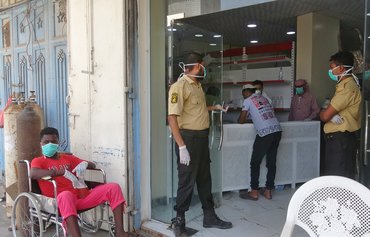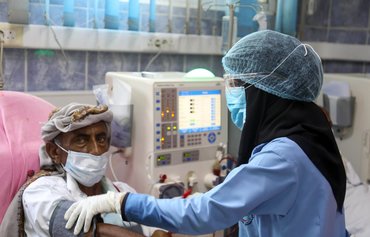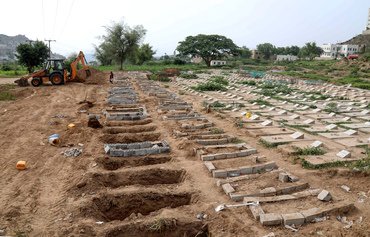A UN team arrived in Aden Thursday (May 28th) to establish an integrated medical unit to fight the novel coronavirus (COVID-19) pandemic.
Following co-ordination with UN organisations and the government's appeals to the international community to support Yemen's dilapidated health sector, the preliminary team of experts will start planning for the establishment of a 100-bed medical unit, Yemeni Minister of Health and Population Nasser Baum said.
The UN Development Programme (UNDP) has contracted with Aspen Medical, a global provider of emergency health care solutions, to establish the unit, which includes an intensive care unit to treat coronavirus cases, he said.
The Ministry of Health in Aden will place all medical facilities at the medical team's disposal to enable it to perform its tasks, Baum said.
He stressed the government's commitment to provide "all support and assistance to UN and regional organisations in implementing programmes in Yemen".
The number of coronavirus infections in Yemen has reached 323 cases, including 80 deaths, as of June 1st, according to the supreme emergency committee for combatting COVID-19.
Flailing health sector
Yemen's health sector needs concerted efforts by the international community and UN organisations to help it tackle the coronavirus outbreak, said emergency committee spokeswoman Eshraq al-Sebai.
"Despite some interventions by [UN] organisations and the help they have provided to the health sector, it is still unable to cope with the increasing number of confirmed cases," she told Al-Mashareq.
"The numbers do not even accurately reflect the extent of the spread of the virus as its symptoms are similar to the febrile diseases that are prevalent in Aden and some other southern provinces," she said.
The official number of confirmed infections "reflects only the number of patients who came to isolation centres and were tested, as only those who show symptoms are tested", said al-Sebai.
"There are not enough health isolation centres and the number of test kits is insufficient," she added.
The daily number of coronavirus deaths in Aden is "high, and once we test all those who died we will be able to determine how catastrophic the situation is and the true extent of the outbreak", she said.
"The situation is bleaker in Houthi-controlled areas," she said, as the Houthis have been accused of concealing the extent of the spread in those areas.
"This will lead to a health catastrophe because they are not treating the matter seriously," she added.
Prevention is crucial
The Ministry of Health is exerting efforts to fight the pandemic in co-operation with the World Health Organisation (WHO) and other organisations, she said.
"But this is not enough, and citizens must adhere to social distancing measures because prevention is better than treatment, especially as there is no treatment for those infected with this virus," al-Sebai said.
"The death toll in Aden is high and there are no capabilities to test for the cause of death in all those fatalities, which topped 1,000 in the month of May," said Mohammed Rubeid, deputy general manager of the Health and Population Office in Aden.
"In the event that testing capabilities become available and investigations are conducted, we will be able to ascertain the cause [of death], be it the coronavirus or other febrile diseases, and take measures to reduce the number of deaths," he said.

![A mask-clad youth sells masks on a street in Yemen's city of Aden on May 17th, amid fears that coronavirus is spreading unhindered in the Yemeni city. Deaths in Aden have surged to five or even seven times higher than normal, an NGO and medics say. [Nabil Hasan/AFP]](/cnmi_am/images/2020/06/03/24319-yemen-aden-masks-600_384.jpg)






